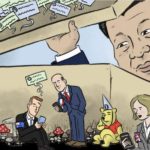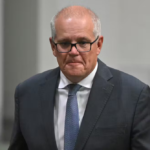Taking on toxic partisanship

Toxic partisans have contempt for those in the other party, insult them, won’t listen to ideas outside their party, refuse to compromise and put their own interests over the country.
We estimate three-quarters of elected officials are toxic partisans while only one-third of regular people display these characteristics. Toxic partisanship leads to zero-sum thinking, revenge politics and gridlock. If we don’t reverse toxic partisanship things will get worse.
But…we’ve got a plan
- Educate: We teach people about what toxic partisanship looks like in real life by translating dense research into easily digestible content.
- Identify: We identify toxic partisans by using public to score elected officials on a partisan scale.
- Empower: We discourage toxic behavior by enabling people to micro fund those running against toxic partisans
- Connect: We connect leaders and voters who share post partisan values to power up the movement.
- Enjoy: We design the app as a game to maximize delight.
Tell me more about this toxic partisanship thing
You’ve seen it, you’ve felt it. You can detect a toxic partisan by the way they speak and by the way they act.
Toxic partisans not only look down on those in the other party, they have contempt for them. Toxic partisans love to trigger political debates (in person or on social media) so they can prove how “right” they are.
They genuinely believe they know what’s best for the country. They believe all of our problems would be solved if everybody else would shut up and just follow their advice.
Toxic partisans don’t need to hear the other side because they’ve already figured out why it’s flawed. Some toxic partisans are more polite, but you can smell their political righteousness anyway.
We think of toxic partisanship as a contagious disease. It infects Americans from every walk of life and political ideology. We especially see it running rampant among those in positions of power and in the media.
The more people are exposed to toxic partisanship, the more it spreads within them. It leads to zero-sum thinking, revenge politics and gridlock. To put it bluntly, toxic partisanship is ripping our country apart.
At ChangeRoots, we are attempting to bring intellectual rigor to how we define and evaluate toxic partisanship. We analyze a spectrum of research to understand the nuances. While it’s still very much a work in progress, our current model identifies seven core characteristics of toxic partisanship:
- Ideological orthodoxy — refusal to entertain views or solutions outside a predetermined set of ideals or compromise.
- Contempt for the other side — a mixture of hate and disgust for those in the other party characterized by insulting them or using dehumanizing language.
- Focus on differences — maximizing attention on that which divides us from those in other political parties.
- Self-interest — prioritizing votes, statements and actions to win re-election over what is in the best long-term interest of constituents.
- Zero-sum mindset (win-lose) — the belief anything the other party considers a “win” is necessarily a loss for your side. And vice versa.
- Assuming negative intent — assuming the worst possible interpretation of any action or statement by someone in the other party.
- Self-righteousness — the belief in a single ‘right’ and moral way to act or think, your way.
Take a moment and think of someone you know personally or an elected official who exhibits these qualities. We all know far too many. To be clear, toxic partisanship has nothing to do with which party you identify with. There are equal amounts of toxic partisan Democrats as there are toxic partisan Republicans.
So how big is the problem?
A landmark study conducted on polarization in the USA by Common Cause identified seven distinct groups of Americans they call our “Hidden Tribes of America: distinguished not by who they are or what they look like, but what they believe.”
The study broke down the country into the Wings (the most extreme) and the Exhausted Majority (everybody else).
“[For those in the Wings] tribalism runs deep in their thinking. Their distrust and fear of the opposing side drives many of the people in these groups, and they have especially negative opinions of each other. When people today speak about how Americans seem to hate each other, they’re usually talking about the opinions and behaviors of the Wings…
In contrast, the remaining two-thirds of Americans show more diversity in their political views, express less certainty about them, and are more open to compromise and change — even on issues that we all tend to consider highly polarizing.”
– Hidden Tribes
At ChangeRoots, we consider the 15% most left-wing and 15% most right-wing part of the population to be toxic partisans. While toxic partisans represent only 30% of the population, they, unfortunately, dominate the national conversation and represent a much larger portion of the media and elected officials.
We estimate as many as three quarters of elected officials and political journalists are toxic partisans, according to our definition.
How do we fight toxic partisanship?
Now that we’ve defined it and better understand the danger it poses, the time has come to develop an antidote. We can’t wait until we perfectly understand all of the different ways toxic partisanship manifests. We have to begin reversing its spread immediately to revitalize our republic.
Post partisanship is our proposed antidote. Post partisanship is a set of values and characteristics that represent what our best leaders should embody. It is the opposite of toxic partisanship. It is the Ariel to the toxic Ursula.

Picture by Jules D. on Unsplash
What is post partisanship?
We want leaders that focus on common ground, look for win-win solutions, make decisions based on evidence and show civility towards all people, including those in the other party. To put it simply, it is a leader who we want our children to be like when they grow up.
While our research continues, we’ve stood on the shoulders of many great thinkers to develop an initial set of characteristics that represent post partisanship:
- Evidence-based decision making — using the best available research evidence — in addition to citizen preferences and personal values — to develop, explain and vote on policy. Regardless of party platform.
- Adventurous civility — Respecting the dignity and ideas of those with whom you profoundly disagree, while acting upon your own beliefs.
- Common ground focus — maximizing attention on that which we share with those in other political parties.
- Public service — Doing what you believe is in the best interest of the public even if it hurts your chances of re-election (e.g. pissing off big donors to do what you believe is right)
- Non-zero sum mindset (win-win) — The belief there is always an outcome where all stakeholders benefit and a commitment to put in whatever effort it takes to discover that outcome.
- Assuming positive intent — Assuming the best possible interpretation of any action or statement by someone, until proven otherwise.
- Humbleness — The belief there is not one right way to do things and the openness to being persuaded to adopt a different approach.
Now take a moment to consider someone in your life or someone you admire that exhibits these qualities. How do they treat people? How do they lead?
We each know someone who embodies post partisanship. Imagine if all of our elected officials acted like that person you are thinking of. What could our country accomplish then?
As with toxic partisanship, post partisanship exists in both parties. There are equal amounts of post partisan Democrats as there are post partisan Republicans in the USA. You don’t need to give up your party in order to act in a post partisan manner.
Post partisanship is a set of values unattached to any party’s platform. It is a code of behavior that exemplifies our very best.
Okay, but how do we achieve it?
ChangeRoots’ mission is to reverse the toxic partisanship infecting political debate. We believe the most effective way to do so is by getting millions of people to reward post partisan behavior and discourage toxic behavior.
We envision a world where each time a politician takes a post partisan action, millions send them a quarter. For each toxic action, millions send their challenger a quarter. Do good, get rewarded. Act toxic, suffer the consequence.
I know at first glance that the idea of adding more money to politics as a cure for toxicity seems counterintuitive. Even offensive. We felt the same way. However, as we thought deeply about what truly motivates politicians. it became clear to us this could actually help.
Right now, most politicians are primarily motivated by getting re-elected. This is the problem. They care about their seat in Congress more than doing what is right for the country. It hit us, why not use that fact to our advantage? So we asked ourselves three crucial questions:
- What if we created a way where it was in the self-interest of politicians to act post-partisan?
- What if, by leading with integrity, treating people with respect, being evidence-based and working across the aisle, a politician could actually raise more money, from more people, than they could any other way?
- What if, when they acted like a toxic partisan, they triggered huge sums of money being sent to their next opponent?
In this reality, it becomes a simple calculation for a politician: Act post partisan, get elected. Act toxic partisan, get fired.
I’m skeptical, why will this work?
Behavioral science teaches that potent feedback is immediate, specific and consequential. If feedback is all three of those things, behavior change is likely. Think about how you teach a dog or a child.
Micro donating in reaction to specific actions makes feedback potent. If politicians don’t wise up, then we keep funding their opponent until they lose election. We want to keep things simple; good leaders are amplified, toxic leaders are fired.
Make Good Trouble
Civil rights leader John Lewis once urged people that “sometimes you have to get in good trouble to make a difference that matters.” All we know is that we’re out here making some trouble — we hope you do the same.
This article was published by ChangeRoots.
Jake Sandler is an American political activist working to understand how technology, politics and psychology can be employed to encourage integrity and non zero-sum thinking. He is the founder of ChangeRoots.com.












